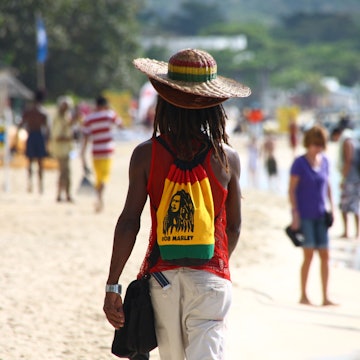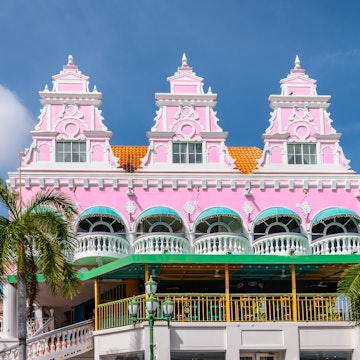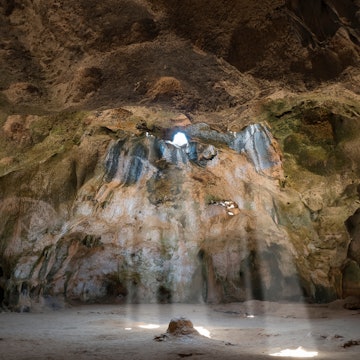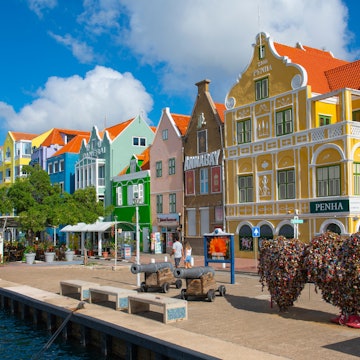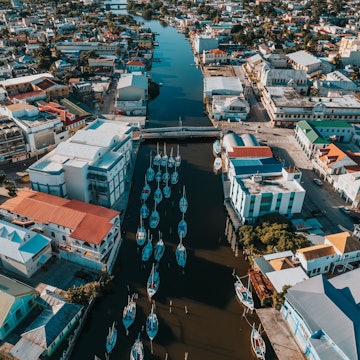

The ”ABC islands” of Aruba, Bonaire and Curaçao offer some of the best diving opportunities in the Caribbean. Vito Palmisano/Getty Images
The southern rim of the Caribbean offers the perfect conditions for taking the plunge.
In and around the Dutch-speaking islands of Aruba, Bonaire and Curaçao (the ABC Islands), the water temperatures are warm year-round, averaging 85°F (29°C). And since the islands sit south of the hurricane belt, you’ll find less extreme weather than in alternative islands to the east and north.
All tiny in size – Curaçao is the largest, at just 171 sq miles (443 sq km) – each one features exciting underwater landscapes off their dreamy coastlines and beneath their turquoise waters.
Whether you’re a lifelong diving aficionado or a total newbie, knowing the differences between each island's unique diving offerings can make or break a trip.
So let's dive in.
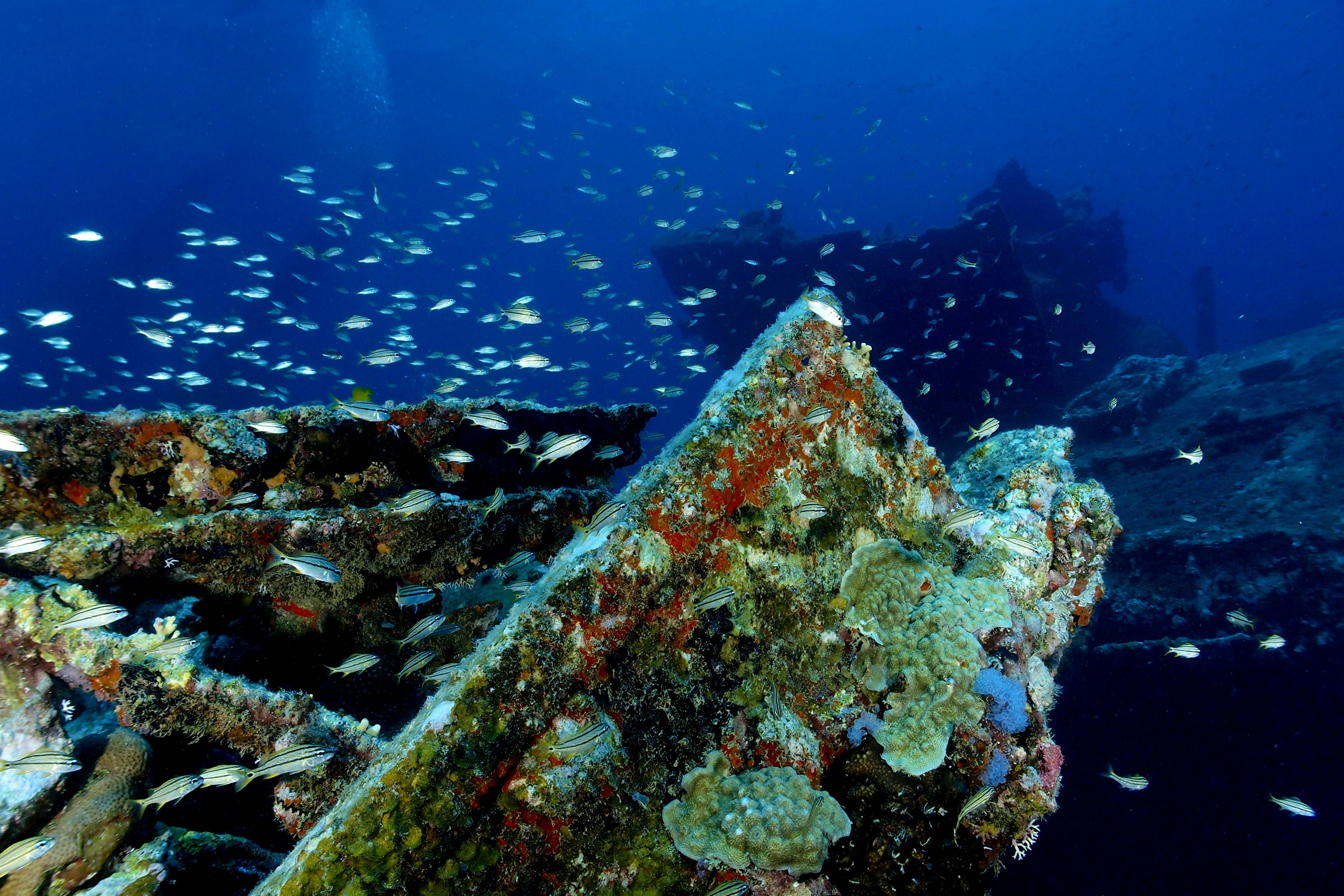
Scuba diving in Aruba
Best for exploring shipwrecks, then lying out on the beach
The best time to go to Aruba
The April-through-November window is ideal, thanks to steady water conditions, sunny days and calm winds.
Why Aruba is perfect for diving
If your vision of scuba diving conjures swimming through shipwrecks, this is your place. Aruba’s southwestern and western shores have more than 10 diveable shipwreck sites.
Additionally, if lengthy white-sand beaches are your vibe, the A of the ABC islands is for you. After you’ve finished your dives, Aruba – as the most developed of the trio – offers everything from a dozen-plus casinos to an ostrich farm.
The best and most popular spots for diving in Aruba
Lying off Aruba’s northern coast, the SS Antilla is the largest shipwreck dive in the entire Caribbean. The remains of the 400-ft(134m)-long vessel contains a maze of sea sponges, neon fish and lobsters – not to mention the lurking pelicans above the waterline.
Also off the northwest coast lies the wreck of the SS California. Appropriate for advanced divers due to strong currents, this 100-plus-year-old site is loaded with stunning coral reefs and coral fish.
Diving companies to book with in Aruba
For diving at your own pace, Pure Diving Aruba offers free drop-off and pick-up island wide, with no fixed daily schedule. Happy Divers Aruba offers the gamut from free-dive trips to snorkeling adventures. At its headquarters in Noord, you will also find a number of diving courses to try.
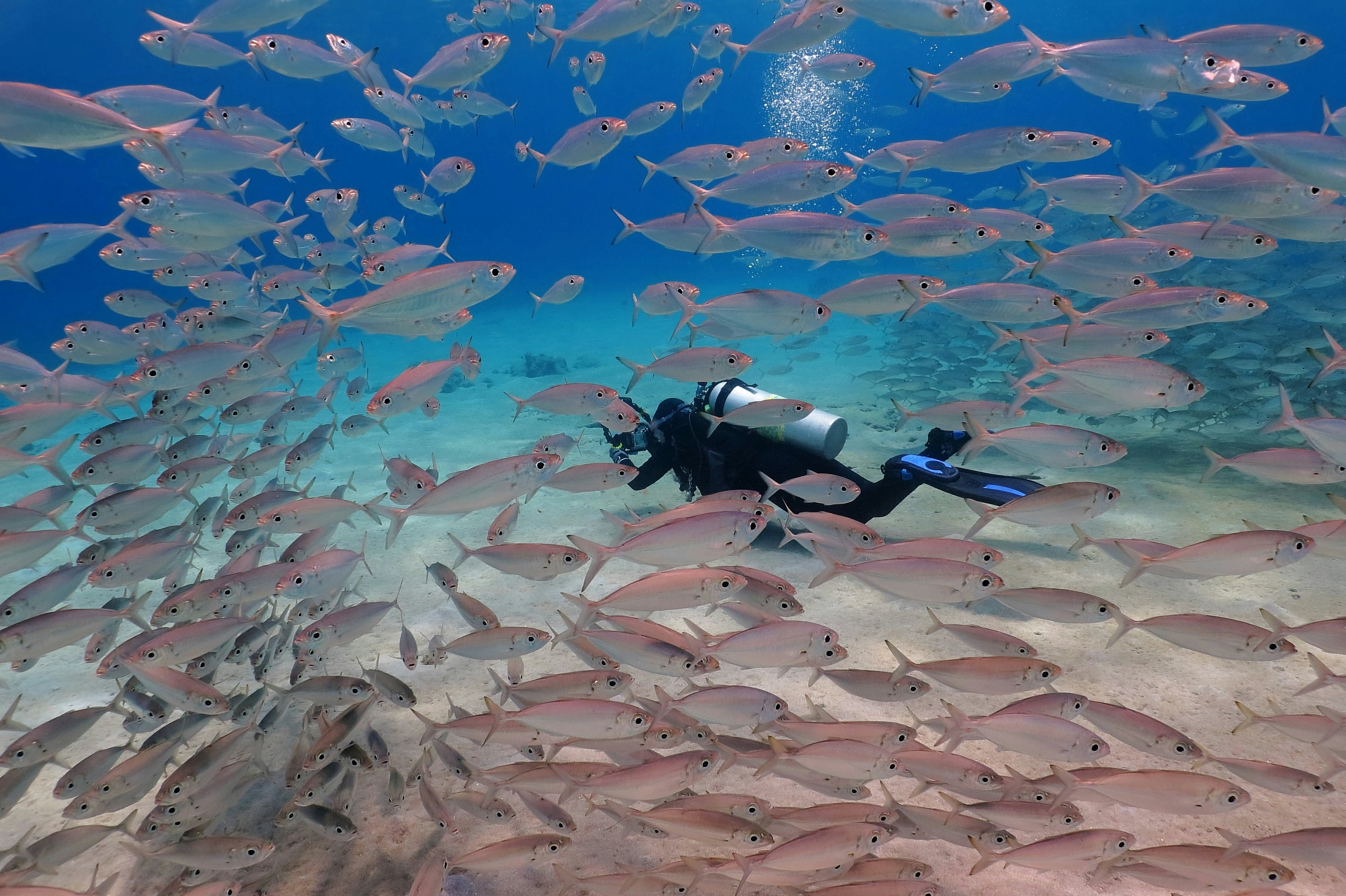
What you’ll see diving in Aruba
Off the runway at Queen Beatrix International Airport, you can see an Air Aruba YS-11 that was purposely sunk to create an artificial reef. Today, it’s a favorite spot for spotting giant barracuda.
Beyond planes, ships and other man-made marvels, divers and snorkelers will find plenty of natural reefs aplenty, too. Off the island’s southern tip at Punta Basora, a long, narrow reef draws stingrays, eagles, loggerhead turtles and tuna along with divers.
Tips before heading out on your dive in Aruba
Boat access is vital for most Aruba dives. Geographically, the eastern and northern coasts are for the more advanced, given their general rockiness and stronger currents. Water visibility typically hovers in the 50-to-100-ft (15-to-30m) range.
Advice for first-time travelers to Aruba
An Embarkation and Disembarkation (ED) card is required to enter the country. As of 2024, the card costs $20 and is best purchased in advance to avoid an added step at the airport. The fee, in part, covers islandwide sustainability efforts and helps preserve the diving landscape.
Can you get a Professional Association of Diving Instructors (PADI) license in Aruba?
Yes.

Scuba diving in Bonaire
Best for shore diving and reef-conservation efforts
The best time to go to Bonaire
For swimming and spotting loggerhead turtles, the summer months of May through July are best. May and June are the less busy options within this timeframe.
Why Bonaire is perfect for diving
Since Bonaire proudly calls itself the “shore diving capital of the world,” you won’t need a pricey boat rental or day-long group outing to be dazzled by the waters here.
Bonaire’s western coast is shielded from strong currents, making for an optimal setting for beginners. There is one principal road that runs north-south along the island’s western edge – EEG Blvd – making hopping between beaches and reefs easy.
The best and most popular spots for diving in Bonaire
Nearly three quarters of Bonaire’s 85 dive sites are accessible from the shore. Indeed, the entire perimeter of the island is designated the Bonaire National Marine Park, meaning options abound. Lac Bay is loaded with mangroves, sea turtles and the endangered queen conch.
Angel City is truly angelic, boasting a double reef that’s suitable for beginners, pros and snorkelers. Its sandy floor is stingray central.
Shipwrecks aren’t nearly as abundant here – though the Hilma Hooker is a former drug-smuggling vessel that pops below water with vibrant coral.
Diving companies to book with in Bonaire
Dive Friends Bonaire has seven dive shops along Bonaire’s western edge, between Hamlet Oasis Resort to the north down to Delfins Beach Resort in the south. In addition to guided shore dives, it’s one of the few places in the region to rent an Avelo scuba system.
Beyond the Corals is a full-fledged diving resort, with PADI-certification courses, continuing dive-education classes and regular excursions.

What you’ll see diving in Bonaire
The waters surrounding Bonaire are home to nearly 60 species of coral and 350 species of fish. Among the more-prized sightings are bottlenose dolphins, stocky yellow frogfish and spot-filled whale sharks. The beachscapes here are diverse, too, many fringed with cliffs and covered with rocks.
Tips before heading out on your dive in Bonaire
As of 2022, non-residents of Bonaire must pay a $75 entry tax, whether you arrive via air or sea. Additionally, be prepared to pay a $40 “nature tag” fee – essentially an entrance fee – to access Bonaire National Marine Park. The fee may be purchased online and covers entrance to the par, as well as Washington Slagbaai National Park, for one year.
Advice for first-time travelers to Bonaire
Bonaire is a friendly destination for beginning divers. Most, if not all, resorts offer unlimited shore diving, which you may also do at night. True beginners should stick to daylight hours for maximum visibility and safety.
Can you get a PADI license in Bonaire?
Yes.

Scuba diving in Curaçao
Best for underwater topography and limestone cliff landscapes
The best time to go to Curaçao
June through September are the best months to avoid crowds. Within this period, September and October are the best months for seeing the coral spawning.
Why Curaçao is perfect for diving
Diving is as possible all over the island of Curaçao. Resorts are in on the action near and far, including Willemstad’s Curaçao Marriott Beach Resort, which has on-site shore excursions, a PADI-certification class and boat trips to Sweet Bottom and Beacon Point; and Sandals Royal Curaçao, which includes PADI-certified scuba diving as part of its amenities.
The best and most popular spots for diving in Curaçao
The buzziest Curaçao diving spot is Double Reef on the south-central coast. You can opt for a boat or shore dive to explore this (yes) pair of reefs, whose landscapes include a shallow reef, sandy area and massive reef mesa.
You’ll be visually delighted by small crabs, puffers, angelfish and other brightly colored creatures. Mushroom Forest near Playa Santa Cruz is loaded with mushroom-shaped coral expanses that resemble an underwater forest.
Diving companies to book with in Curaçao
Jan Thiel Diving offers advanced open-water packages, guided night dives and the chance to swim with dolphins. The Dive Bus, just south of Willemstad, is a feel-good operation, with “fun dives” for groups, cold beer and wi-fi at its shop.
If you’ve ever dreamed of turning into a mermaid, Scubacao has a diving lesson where you learn to navigate while wearing a mermaid-esque tail.
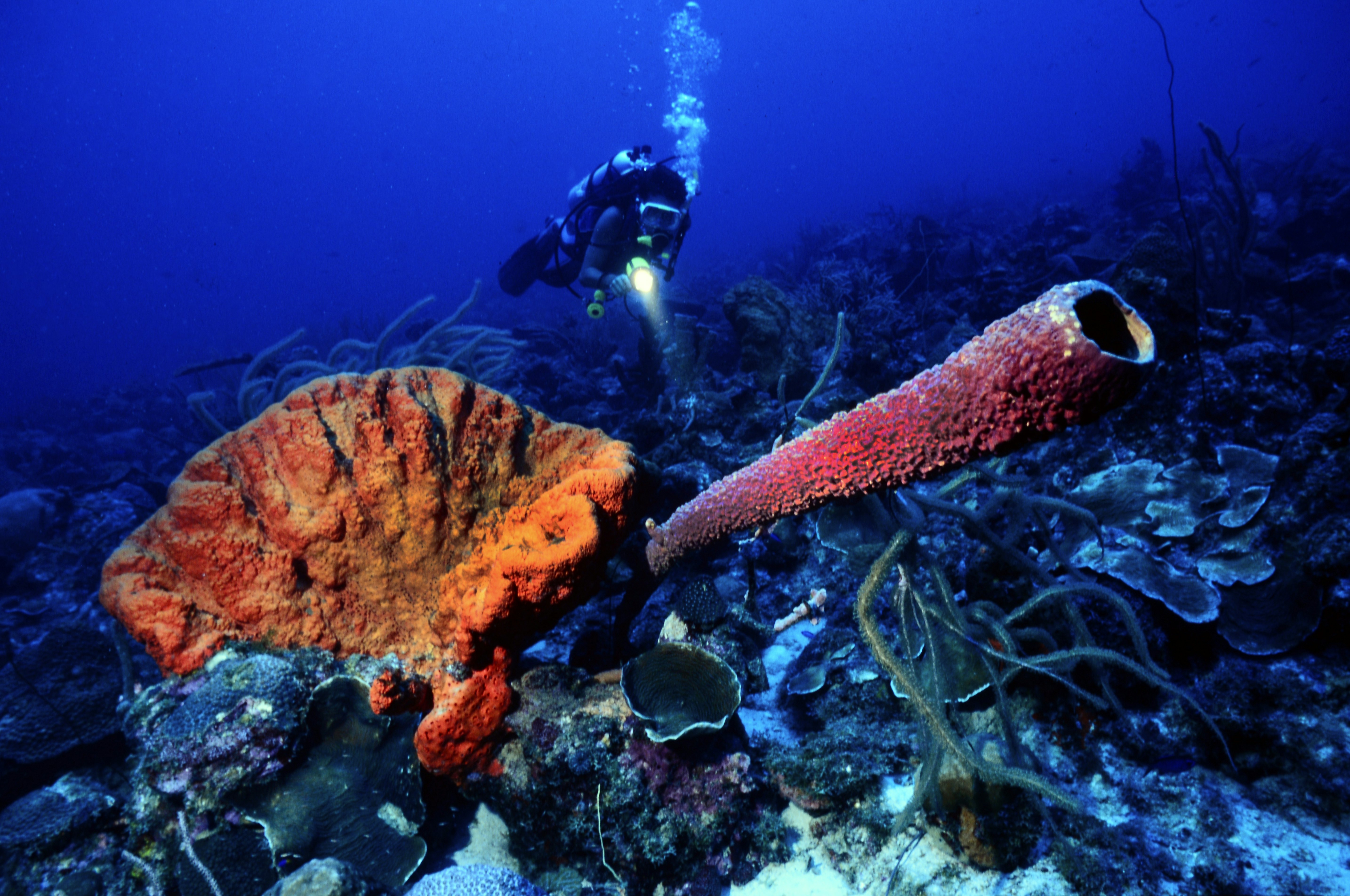
What you’ll see diving in Curaçao
To catch the coral spawning, target an excursion seven days after the full moon in September or October. During this magnificent underwater display, it will feel as if the coral is generating stars around you.
Creole wrasses, cornet fish and spotted eagle rays are among the more unique creatures you’ll see during a dive here.
Tips before heading out on your dive in Curaçao
The west side of the island is generally better-protected from stronger waves, currents and wind. With that, make sure to double-check the weather for any looming storms, which may make shore dives in particular more difficult.
Advice for first-time travelers to Curaçao
If don’t want to plan a dive trip yourself, know that there are plenty of resorts island-wide that cover meals, trips and customizable packages. As their names might suggest, LionsDive Beach Resort and Scuba Lodge offer diving-focused amenities aplenty.
Can you get a PADI license in Curaçao?
Yes.
Tips and best practices for being a sustainable diver
Lather up with biodegradable, reef-friendly sunscreen.
Stony coral tissue loss disease (SCTLD) is affecting and hurting reefs throughout the region. Consult with a trusted dive shop on which reefs may be affected at the moment and the precautions to take.
Leave no trace – including limiting plastic waste – and never take any coral with you.
Keep a safe distance from marine life and resist the temptation to touch it.








